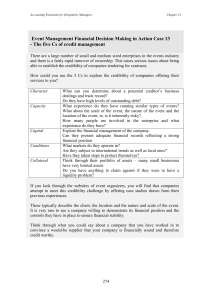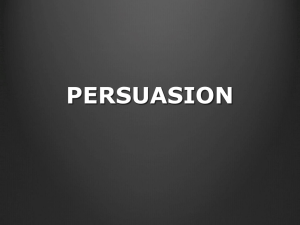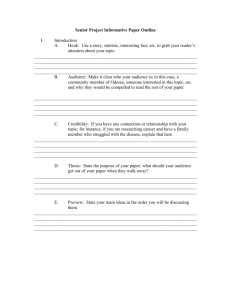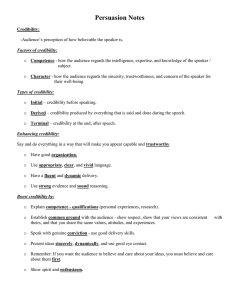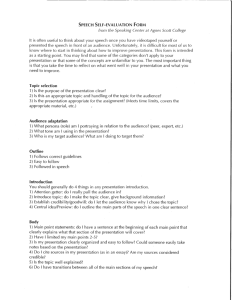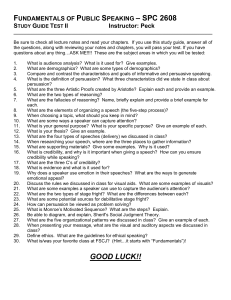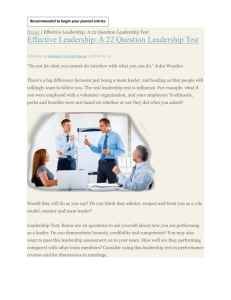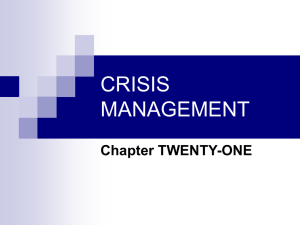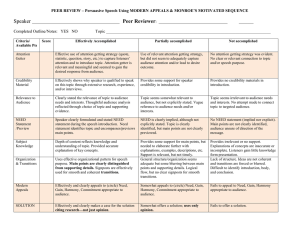PERSUASION Credibility
advertisement
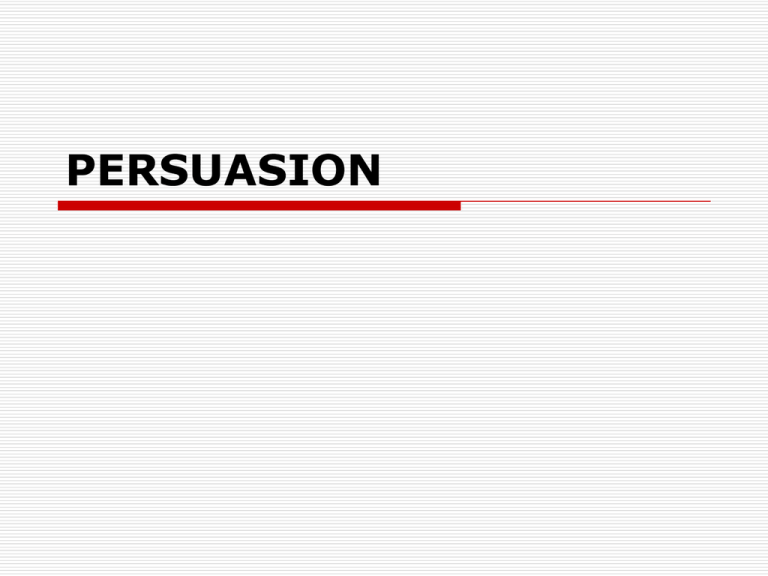
PERSUASION Credibility: - Audience’s perception of how believable the speaker is - Factors of credibility: Competence- how the audience regards the intelligence, expertise, and knowledge of the speaker/ subject Character- how the audience regards the sincerity, trustworthiness, and concern of the speaker for their well-being Types of credibility: - Initial- credibility before speaking - Derived- credibility produced by everything that is said and done during the speech - Terminal- credibility at the end; after the speech Enhancing credibility: - Say and do everything in a way that will make you appear capable and trustworthy - Have good organization - Use appropriate, clear, and vivid language - Have a fluent and dynamic delivery - Use strong evidence and sound reasoning Boost credibility by: - Explain competence- qualifications (personal experiences, research) - Establish common ground with the audience- show respect, that your views are consistent with theirs, that you share the same values, attitudes and experiences - Speak with genuine conviction- use good delivery skills - Present ideas sincerely, dynamically and use good eye contact - Show spirit and enthusiasm **Remember: If you want the audience to believe and care about your ideas, you must believe and care about them first.** Ethos: Personal appeal Credibility appeals- relies on speaker to convince listeners - believability- shows knowledge and interest in topic - ethical standards- acknowledges the other side of the issue and demonstrates thorough research - dynamic - sincere - good reputation - good appearance Expertise Trustworthiness Perceived good intentions Pathos: Emotional appeal - Uses a listener’s feelings to persuade them guilt fear freedom justice greed patriotism belonging anger happiness - Understand how audience feels Logos: Logical appeal - Uses solid evidence and sound reasoning to convince listener - Is this fact or opinion? - Is the information current? - Is the source credible? - Is it relevant? - Is it valid or representative? - Appeal to audience’s intellectual, rational side - Use forceful, clear arguments to make a point - Considered substance of a speech Fallacies: - Red herring- introduces irrelevant issue to divert attention away from the subject - Ad hominem (against the man)- attacks the person - False dilemma or “either-or”- forces listeners to choose between two choices, when more exist - Bandwagon- assumes that because something is popular, it is therefore good, correct, or desirable; join everyone else Fallacies cont’d: - Unrelated testimonial- endorsement by someone who is disconnected from the product/idea. - Glittering Generalities- vague and general statements that cannot be proven or disproven. - Card Stacking- piling up information about an idea/product without much backing. - Transfer- projecting positive or negative qualities of a person, object, or value to another in order to make the second more acceptable or to discredit it. Questions used to analyze an audience: How old are they? What is the gender breakdown? What is their economic background? What are their political or religious views? How many will be in favor of your position? Against it? Four categories of audiences: 1. 2. 3. 4. supportive uncommitted indifferent opposed MONROE’S MOTIVATED SEQUENCE: Step 1- Attention (gain audience’s attention about issue) Step 2- Need (describe the problem) Step 3- Satisfaction (describe the solution; how to solve the problem) Step 4-Visualization (so audience can picture solution in their minds; what world will be like if solution is put into place) Step 5- Action (what do we do; what is audience goal)
